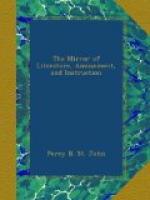Bird Catching.
The golden-crested wren may be taken by striking the bough upon which it is sitting, sharply, with a stone or stick. The timid bird immediately drops to the ground, and generally dead. As their skins are tender, those who want them for stuffing will find this preferable to using the gun.—Mag. Nat. Hist.
Shower of Herrings in Ross-shire.
In April last, as Major Forbes, of Fodderty, in Strathpfeffer, was traversing a field on his farm, he found a considerable portion of the ground covered with herring fry, of from three to four inches in length. The fish were fresh and entire, and had no appearance of being dropped by birds—a medium by which they must have been bruised and mutilated. The only rational conjecture that can be formed of the circumstance is, that the fish were transported thither in a water-spout—a phenomenon that has before occurred in the same county. The Firth of Dengwall lies at a distance of three miles from the place in question; but no obstruction occurs between the field and the sea, the whole is a level strath or plain, and water spouts have been known to travel even farther than this.—Inverness Courier.
Spanish Asses.
The Duke of Buckingham has, at his seat at Avington, a team of Spanish asses, resembling the zebra in appearance, which are extremely tractable, and take more freely to the collar than any of our native species.
Drawing Instrument.
An ingenious invention of this description was recently exhibited at the Royal Institution. A pencil and a small bead are so connected together by means of a thread passing over pullies, that if a person, looking through an eye-piece, will hold the pencil upon a sheet of paper, and then, watching the bead, will move his hand, so that the bead shall trace the lines of any object that is selected or looked at, he will find that, whilst he has been doing this, he has also made a drawing of the subject upon the paper; for the pencil and the bead describe exactly the same lines, though upon different planes. Thus, a drawing is made, without even looking at the paper, but solely at the object.
White Cats.
In a recent number we quoted from Loudon’s Gardener’s Magazine, that “white cats with blue eyes are always deaf,” of which extraordinary fact there is the following confirmation in the Magazine of Natural History, No. 2, likewise conducted by Mr. Loudon:—“Some years ago a white cat of the Persian kind (probably not a thorough-bred one) procured from Lord Dudley’s at Hindley, was kept in my family as a favourite. The animal was a female, quite white, and perfectly deaf. She produced, at various times, many litters of kittens, of which, generally, some were quite white, others more or less mottled, tabby, &c. But the extraordinary circumstance is, that of the offspring produced at one and the same birth, such as, like the mother, were entirely white, were, like her, invariably deaf; while those that had the least speck of colour on their fur, as invariably possessed the usual faculty of hearing—” W. T. Bree, Allersley Rectory, near Coventry.




